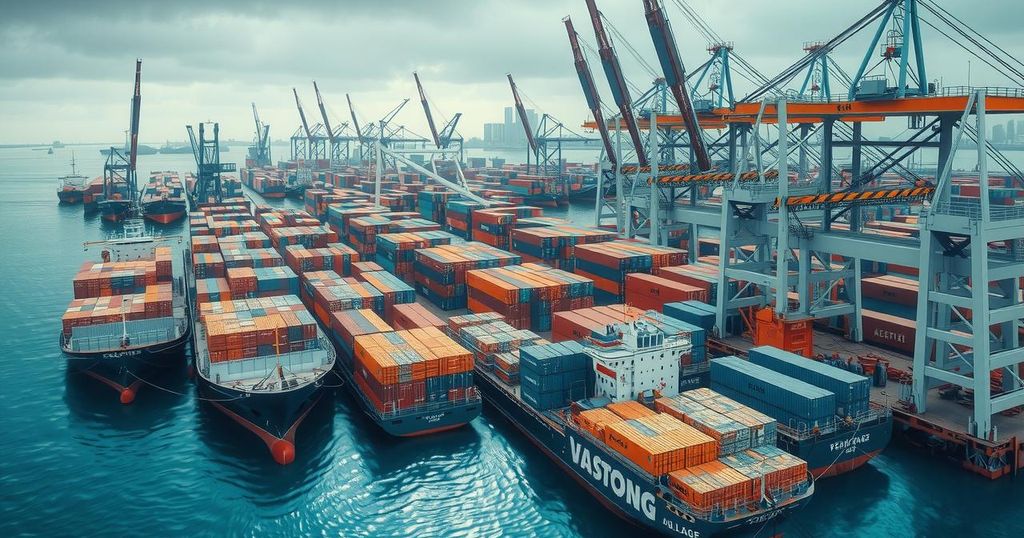Trade Tensions Rise as India and Bangladesh Impose Restrictions

India and Bangladesh have imposed reciprocal trade restrictions following political turmoil, impacting businesses reliant on cotton yarn imports and export routes. Relations have soured since former Prime Minister Hasina was ousted, and both countries face growing public sentiment against one another. Firms in Bangladesh’s garment industry are especially affected, and there are fears of further trade barriers as regional dynamics shift.
Businesses in both India and Bangladesh are feeling the effects of newly imposed trade restrictions as relations between the two countries continue to deteriorate. The backdrop includes a series of verbal disputes that reach a boiling point recently when Bangladesh restricted land imports of cotton yarn from India in an attempt to protect local industries from cheaper imports.
Just days before Bangladesh’s action, India suspended a crucial transhipment facility it had extended to Bangladesh. This facility previously allowed Bangladeshi exporters to send goods via India to reach third-party countries efficiently. The reasons given for this suspension were related to “congestion,” casting a shadow on trade dynamics between the neighboring nations.
Tensions have escalated since the ousting of former Prime Minister Sheikh Hasina in August amid massive protests. Hasina is currently in exile, and Bangladesh is now under the administration of Nobel Peace Prize laureate Muhammad Yunus. His administration has taken a hard stance, demanding Hasina’s extradition to face serious charges, a request that India has not officially responded to as of yet.
Adding fuel to the fire, Indian officials have condemned reports of assaults against the Hindu minority in Bangladesh. They pointed out the alleged murder of a Hindu community leader, labeling it part of a systematic campaign against minorities under the current interim government, a claim that Dhaka vehemently denies.
Firms engaged in the garment export industry are feeling the squeeze. Cotton yarn, critical for the sector, can still enter Bangladesh via sea and air, but those routes are notably slower and more expensive. In 2024, India had exported around $1.6 billion worth of cotton yarn to Bangladesh, much of which benefitted from rapid land port access.
Anis Ahmed, head of the MGH Group, a logistics firm connected to brands like Zara, stated, “It’s a blow to Bangladesh’s fast-fashion export industry,” noting that transporting goods by sea could take up to eight weeks, a significant delay compared to the previous routes.
Bangladesh is now the second-largest garment exporter globally after China, exporting $38 billion last year. A considerable portion of this, over $1 billion, relied on the India land route until recently, and now, companies face a tough uphill battle with reduced efficiency.
The cessation of the transhipment facility follows Yunus’s remarks made during a visit to China, where he referred to Bangladesh as the “only guardian of the ocean” for India’s northeast. Those comments have taken on a more sensitive appearance in Delhi, inciting worries about China’s growing influence in the region.
Moreover, both countries have their eyes on the future amid increasing public dissatisfaction. Public sentiment in Bangladesh has turned against India, especially due to stricter visa regulations that have severely reduced travel. Once, two million Bangladeshis visited India each year, but that number has dwindled, with visa approvals plunging by 80% since Hasina was ousted.
In the wake of increasing tensions, India’s clothing manufacturers have appealed to prohibit Bangladeshi garment imports via land, raising fears of reciprocal trade barriers which could prove harmful for both sides. Economists in Bangladesh have suggested re-evaluating transit arrangements that had previously benefited India, hinting at a shifting stance within Dhaka.
An emerging worry is the warming relationship between Bangladesh and Pakistan. A visit by Pakistan’s Foreign Secretary to Dhaka— the first in 15 years— has raised eyebrows in Delhi, especially given its timing amid regional tensions. Former Indian foreign secretary Shyam Saran expressed similar concerns, noting, “If there is an intent to make things difficult for India, that will obviously cause concern.”
As both nations grapple with these challenges, there are significant risks lurking in the shadows. The deterioration in public opinion toward each other may reverse the years of people-to-people ties that had once flourished. If not addressed, these tensions could severely impact trade and economic relations.
The ongoing situation calls for careful navigation to prevent further escalation of hostilities, and industries on both sides must count the costs as political dynamics shift.
In summary, escalating tensions between India and Bangladesh, highlighted by trade restrictions and political instability, are straining business operations in the region. As both nations grapple with internal and external pressures, the industrial sectors are bracing for impact. With key transit routes disrupted and growing political animosity, companies in both nations must now navigate an uncertain landscape. This situation not only affects trade but also signals a potential shift in regional dynamics that could have long-lasting implications for economic cooperation.
Original Source: www.bbc.com








